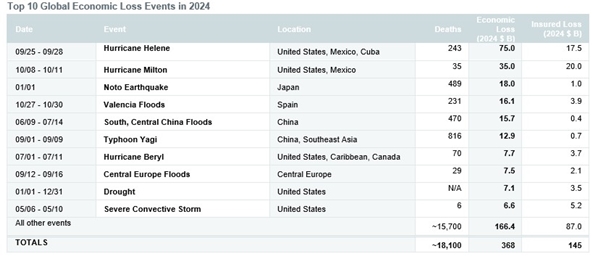Aon plc (NYSE: AON), a leading global professional services firm, today published its 2025 Climate and Catastrophe Insight report, which identifies global natural disaster and climate trends to quantify the risk and human impact of extreme weather events in 2024.
The report reveals global natural disaster events caused $368 billion (2023: $397 billion) in economic losses in 2024, driven by hurricanes and severe convective storms (SCS) in the U.S. This is 14 percent above the 21st-century average and the ninth consecutive year of losses exceeding $300 billion.
Greg Case, CEO of Aon, said: “The devastating events of 2024 underscore the significant economic toll of climate risk. Evidenced by the data in our report – and the tragic destruction in California at the beginning of 2025 – extreme weather remains a powerful force driving the complexity and volatility that businesses and communities face and emphasizes the urgent need for innovative solutions to address this growing challenge.”
The Climate and Catastrophe Insight report points to several trends with natural catastrophe losses:
Weather-related events are becoming more frequent and costly. Global insurance losses in 2024 were 54 percent above the 21st-century average, covering $145 billion of the $368 billion in damages (2023: $126 billion). Even as insured losses far exceeded the average, the protection gap stood at 60 percent (2023: 68 percent), representing a significant financial headwind to communities, businesses and governments. Increases in population, wealth and overall exposure to natural hazards in high-risk areas continues to be a crucial component of growing disaster losses.
Hurricane Helene was the costliest global event in 2024. The hurricane made landfall in the U.S. in September and caused $75 billion of damages and 243 fatalities. Hurricane Milton in October was the costliest single global insured loss event, causing $20 billion in losses. These are major contributors to the fact that 78 percent of global insured losses were recorded in the U.S.
The steady growth of SCS losses reflects increasing population, exposure and wealth. There were at least 54 global events that each resulted in economic losses above $1 billion in 2024, which is above the average of 44. The increase in the number of billion-dollar events is largely driven by SCS in the U.S. Growing exposure to this peril increases the likelihood of billion-dollar disaster occurring, particularly as the U.S. continues to experience spatial growth of cities in areas regularly affected by SCS activity, such as Dallas, Houston or Denver.
In terms of climate, 2024 was the warmest year on record. Twenty countries and territories recorded their highest temperatures during a year which saw the end of 15 consecutive months of record global high temperatures in August.
Case added: “When it comes to climate risk, the stakes could not be higher. The $223 billion in uninsured losses in 2024 challenges the ability to rebuild, recover and create more resilience across the globe. Part of the solution requires investments in technology and analytics to model and price the risks and attract deeper capital pools that can see a potential return on investment to take on these risks. Capital will not go where it is not protected – and the events from 2024 should stimulate innovation across our industry to strengthen the global economy.”
Aon’s report also shows that with greater resilience and mitigation measures in place, global economies can reduce damage and loss of life. In 2024, 18,100 people lost their lives due to natural hazards, mostly from heatwaves and flooding globally. This was below the 21st-century average of 72,400 and could be attributed to improved warning systems, weather forecasts and evacuation planning, underscoring the value of reliable climate data, insights and analytics.
Andy Marcell, CEO of Risk Capital for Aon, said: “The insurance industry – and broader financial community – has the opportunity to bring new sources of capital to protect vulnerable communities and strengthen the global economy. The collaboration between various stakeholders will be crucial in developing public-private partnerships and innovative insurance products that offer a sustainable way of closing the protection gap.”
The report reveals that Spain, Brazil, U.A.E. and Vietnam all recorded their costliest insurance events in 2024. The top 10 global economic loss events were as follows:

Michal Lörinc, head of Catastrophe Insight at Aon, said: “Our understanding of natural hazards continues to evolve, but one trend is clear – we continue to see a greater number of large-scale disasters in terms of financial loss. Businesses and communities need to prepare their people, operations and properties using insights from the latest forecasting models, analytics and reliable climate data.”
Aon’s 2025 Climate and Catastrophe Insight report can be found here
|

